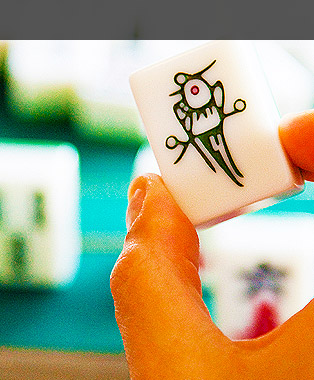Majiang Scoring
Since a score can become ridiculously large, a limit is usually applied. In England, the limit is usually 2000 points although tournament limits tend to be 1000 points.
Scoring can be complicated. If a player went Majiang with a special hand or a player was Calling on a special hand at Majiang, the scores in the Special Hand table apply. Otherwise, the value of each hand is calculated, bonus points are added and, if appropriate, any doubling then takes place. The value of each hand is calculated as per the following two tables:
Combination | Exposed | Concealed |
Minor tile Pong | 2 | 4 |
Major tile Pong | 4 | 8 |
Minor tile Kong | 8 | 16 |
Major tile Kong | 16 | 32 |
Pair of Dragons | 2 | 2 |
Pair of prevailing Wind | 2 | 2 |
Pair of player's own Wind | 2 | 2 |
For going Majiang | 10 |
For drawing the winning tile from the wall | 2 |
For going Majiang with the only possible tile | 2 |
Once the basic scores have been evaluated, each player's score is doubled for each item in the following table:
Pong or Kong of the player's own Wind (concealed or exposed) | Double |
Pong or Kong of the prevailing Wind (concealed or exposed) | Double |
Pong or Kong of Dragons | Double |
Finally, there are some additional doubles that apply to the hand that went Majiang only.
No Chows | Double |
Non-scoring hand (4 chows and a pair) | Double |
All one suit and some Dragons and/or Winds | Double |
All major tiles and some Dragons and/or Winds | Double |
All Dragons and/or winds | Double |
All 4 Winds (3 sets and 1 pair) | Double |
All 3 Dragons (2 sets and 1 pair) | Double |
Going Majiang with a loose tile | Double |
Going Majiang with the last tile from the wall | Double |
Going Majiang by Robbing the Kong | Double |
Rarely, a player may be Calling after his first discard. This is called an "Original Call". A Majiang made with those same 13 tiles plus a tile discarded or taken from the wall in subsequent turns. | Double |
Pongs/Kongs of any one suit and a pair. No Winds, Dragons or Chows. | Double three times |
The player who went Majiang is then paid by the other players the amount scored by his hand. This means that the player who gets Majiang always wins the round, even if other players have scored greater amounts. If East wins, the others pay double. If not, East pays double.
Each losing player pays any other losing player with a greater value hand, the difference between the two hands, with East paying and/or receiving double the difference.
域名 Majiang.net 正在出售中,如果您对该域名感兴趣,请点击这里提供您的报价。
The domain name Majiang.net maybe for sale. Please click here if you would like to make an offer.



